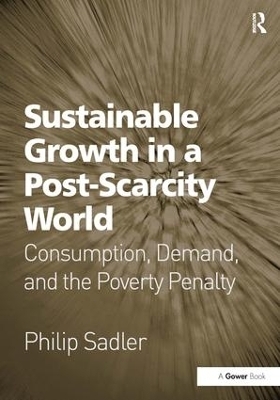
Sustainable Growth in a Post-Scarcity World
Gower Publishing Ltd (Verlag)
978-0-566-09158-2 (ISBN)
- Titel z.Zt. nicht lieferbar
- Versandkostenfrei innerhalb Deutschlands
- Auch auf Rechnung
- Verfügbarkeit in der Filiale vor Ort prüfen
- Artikel merken
Over 20 years ago Philip Sadler, then head of a leading British business school, wrote Managerial Leadership in the Post-Industrial Society. In it he predicted that business would experience the most radical transformation since the Industrial Revolution of the 19th century. This transformation has now taken place. In his latest book, Sustainable Growth in a Post-Scarcity World, Sadler charts developments once envisaged by Keynes, Chase, Galbraith and Packard, and more recent radical thinkers such as Chris Anderson. Sadler describes how many goods and services have moved from relative scarcity to relative abundance, and asks how this trend can be reconciled with the global issues of population growth and climate change. He assesses the impact of new technologies, new energy sources, new materials and the development of artificial intelligence, on business, government and economics, and discusses the challenges ahead - the creation of new business models, the need to meet people's legitimate expectations of improved living conditions while avoiding environmental catastrophe, and the need to adapt ideas developed in scarcity to conditions of abundance. Why is it that in countries foremost in creating post-scarcity conditions, millions are still in poverty, and billions, worldwide, still lack basic necessities of life? Philip Sadler agrees with those who say the relief of global poverty cannot rely on aid and corporate philanthropy. He explores the idea of re-engineering products and delivering them into bottom-of-the-pyramid (BOP) markets, and concludes that the more global companies take this route, as some are already doing, the more profitable they will find it, and this will in turn help the poorest people who currently pay more for goods and services - the 'poverty penalty' - than the rich.
Philip Sadler graduated from the London School of Economics with first class honours. He joined Ashridge Management College (now the Ashridge Business School) as Director of Research and subsequently became Chief Executive, a position he held for twenty years, leading the team which built Ashridge's reputation as one of the world's leading Business Schools. He is now a life vice-president of the College. Philip's practical experience in the business world has been gained through non-executive directorships in printing, banking, healthcare, consultancy, and engineering (including a spell as company chairman). He is an honorary senior fellow and patron of the think tank Tomorrow's Company, having served for three years as a member of the Board and Chairman of the Research Committee. He was a co-author of the 2004 report Restoring Trust; investment in the 21st century and the 2005 report The Ageing population, Pensions and Wealth Creation. More recently he helped draft the report Tomorrows Global Company and co-authored its most recent publication, Tomorrow's Owners. In 1986 he was appointed CBE for services to management education. He holds the honorary degrees of Doctor of Science of City University and Doctor of Business Administration of De Montfort University. He is a gold medallist of the Chartered Institute of Management, a Fellow of the International Academy of Management and a Fellow of the Chartered Institute of Personnel and Development. Philip Sadler has authored more than 10 books on management topics.
Contents: Preface; Part 1: The Coming of Post-Scarcity Society: The post-scarcity paradox; The prophets of abundance; A short history of system change; Abundance and waste in today's economy; How science and technology are creating tomorrow's abundance. Part 2: Sustainability: Fifty wasted years; Sustainability issues in a post-scarcity world. Part 3: The Poverty Trap: Poverty across the globe; The promise of alternative finance and social business. Part 4: The Response of Business: The business response to abundance; The business response to sustainability; The business response to poverty. Part 5: System Change: The prospect for system change; References; Index.
| Erscheint lt. Verlag | 28.12.2010 |
|---|---|
| Sprache | englisch |
| Maße | 174 x 246 mm |
| Gewicht | 650 g |
| Themenwelt | Naturwissenschaften ► Biologie ► Ökologie / Naturschutz |
| Wirtschaft ► Betriebswirtschaft / Management ► Unternehmensführung / Management | |
| Wirtschaft ► Volkswirtschaftslehre ► Makroökonomie | |
| Wirtschaft ► Volkswirtschaftslehre ► Mikroökonomie | |
| ISBN-10 | 0-566-09158-5 / 0566091585 |
| ISBN-13 | 978-0-566-09158-2 / 9780566091582 |
| Zustand | Neuware |
| Haben Sie eine Frage zum Produkt? |
aus dem Bereich


